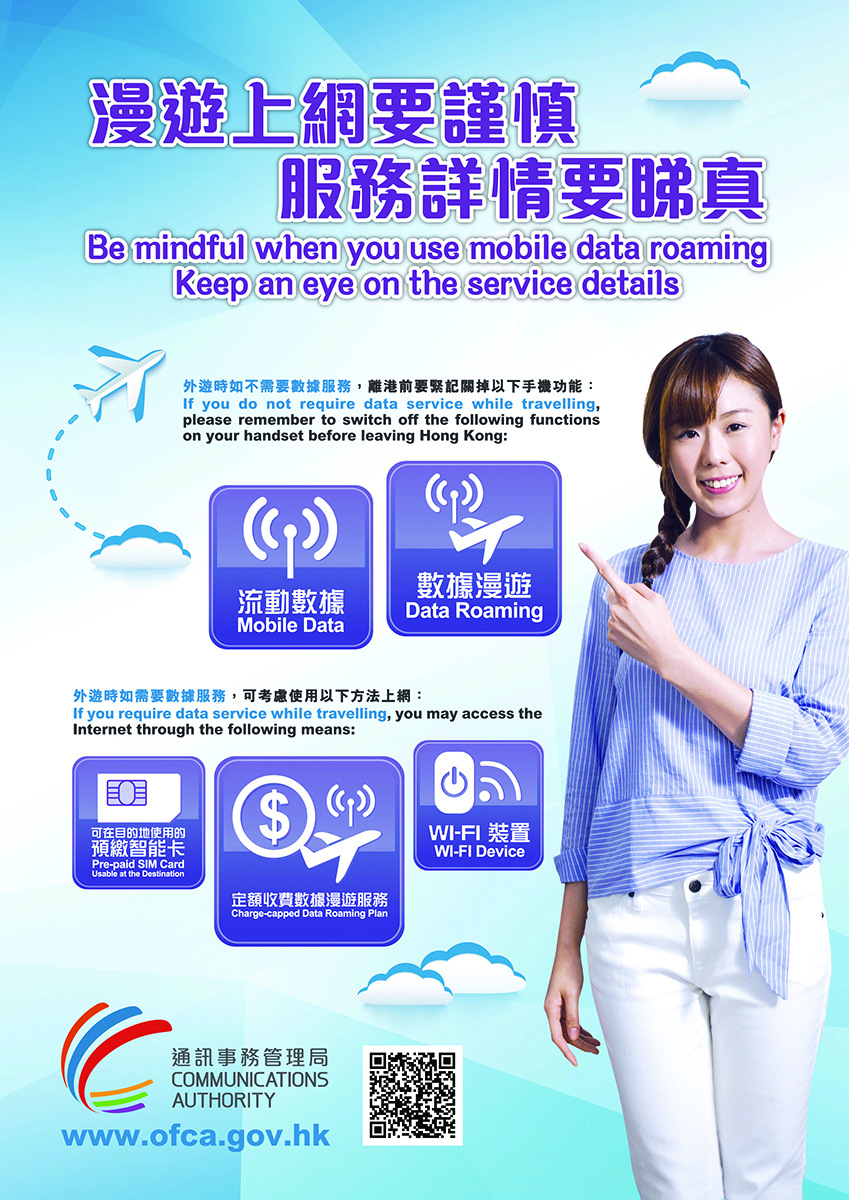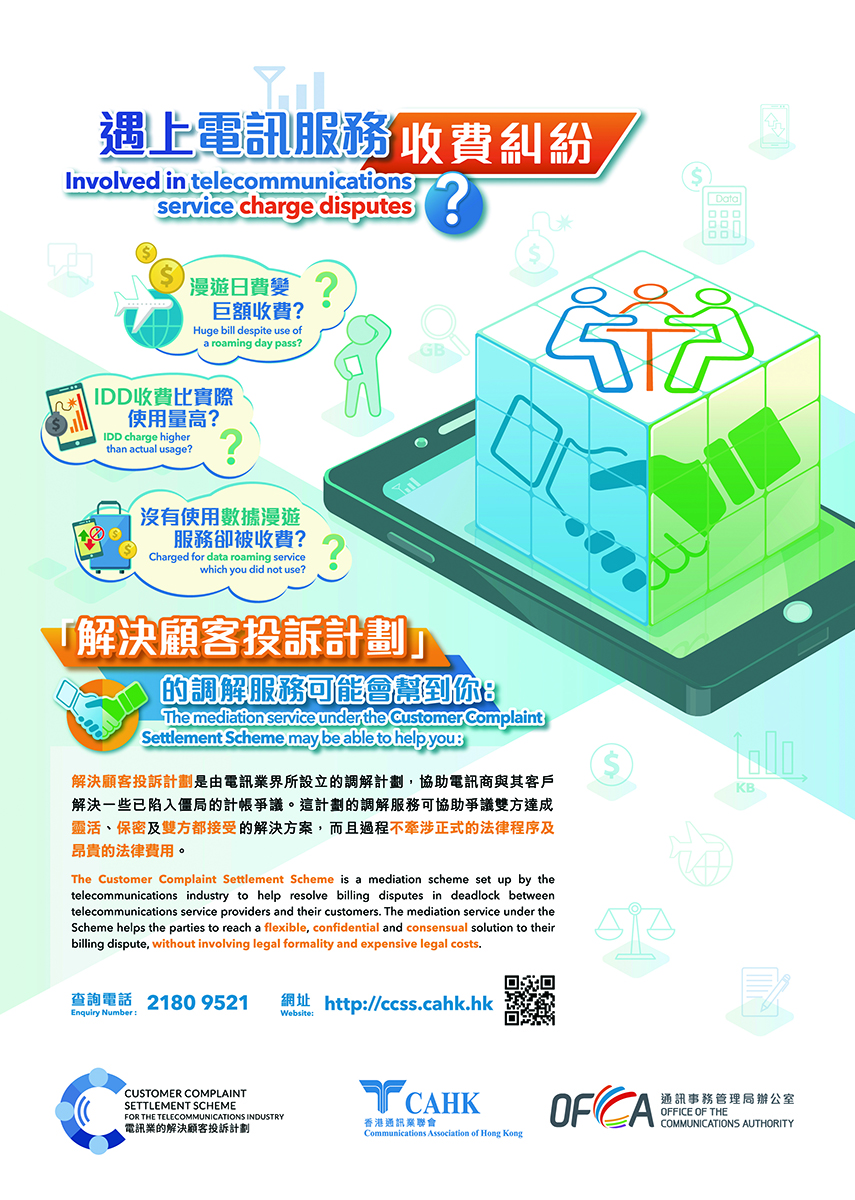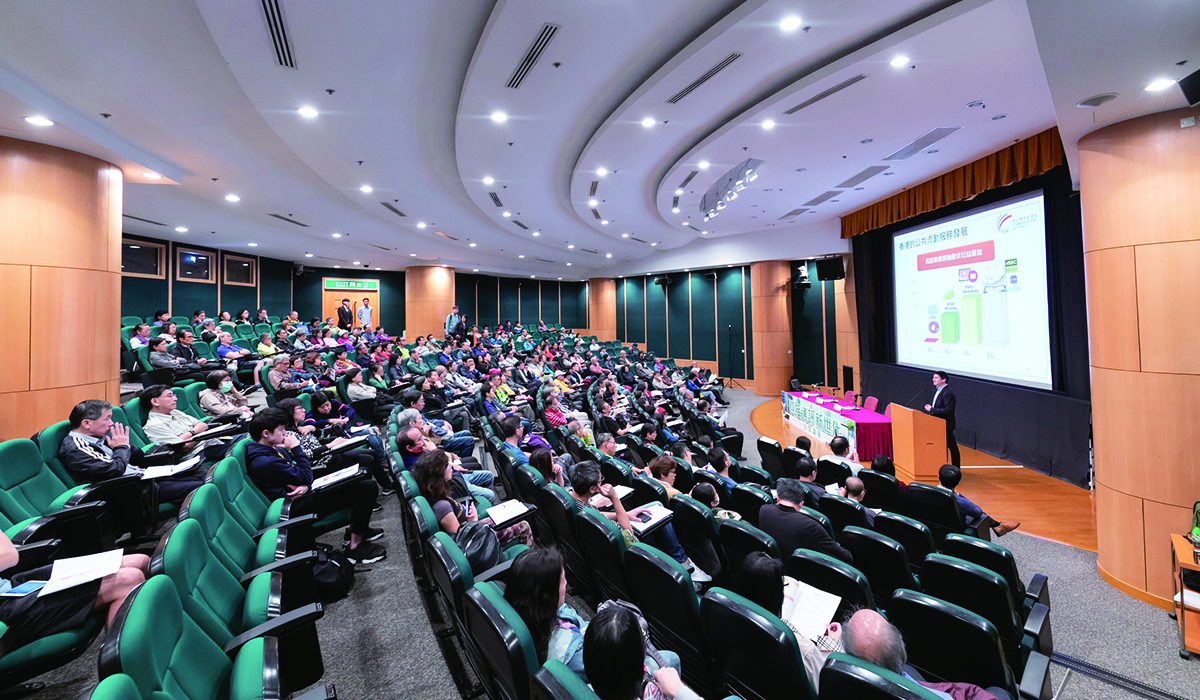Handling of and Investigations into Competition Complaints in the Telecommunications and Broadcasting Sectors, and Merger & Acquisition Cases in the Telecommunications Sector
The Competition Ordinance (CO) provides for a cross-sectoral competition law prohibiting anti-competitive conduct in all sectors. Under the CO, the CA is conferred concurrent jurisdiction with the Competition Commission to enforce the CO in respect of the conduct of undertakings operating in the telecommunications and broadcasting sectors, including merger and acquisition activities involving carrier licensees in the telecommunications sector.
Pursuant to the memorandum of understanding signed by the CA and the Competition Commission, the CA will ordinarily assume the role of the lead authority for matters falling within the concurrent jurisdiction. For matters involving issues that are partly within and partly outside the concurrent jurisdiction, the CA and the Competition Commission will discuss and agree on how best to process the matter on a case-by-case basis.
From 1 April 2018 to 31 March 2019, a total of 42 complaints and/or enquiries were received under the CO, with 39 cases closed without the need for further actions and three cases under processing.
During the year, OFCA also assisted the CA in reviewing two transactions under the merger rule of the CO. While no further action was considered necessary in respect of one of the transactions, the CA identified competition issues in the other transaction concerning the proposed acquisition of WTT Holding Corp. announced by HKBN Ltd. in August 2018. In this case, the merging parties offered commitments to the CA in January 2019 under section 60 of the CO to address the CA's competition concerns, in return for the CA not commencing an investigation or bringing proceedings in the Competition Tribunal in relation to the transaction. The CA considered the proposed commitments sufficient in addressing its competition concerns, and sought representations in accordance with the CO from the industry and interested parties regarding its proposed acceptance of the proposed commitments. Having considered the representations received, the CA took the view that the proposed commitments would need to be revised to address certain matters raised in the representations, and communicated its views to the merging parties. The merging parties then offered a set of revised commitments in March 2019. The CA considered the revised commitments sufficient to effectively address its competition concerns. The CA announced its decision in April 2019 to accept the revised commitments under section 60 of the CO and not to commence an investigation into the transaction under section 39 of the CO.
Handling of and Investigations into Complaints about Unfair Trade Practices in the Telecommunications and Broadcasting Sectors
The fair trading sections of the Trade Descriptions Ordinance (TDO) prohibit certain specified unfair trade practices by traders in the provision of goods and services to consumers.
The CA is conferred concurrent jurisdiction with the Customs and Excise Department to enforce the fair trading sections of the TDO in relation to the commercial practices of licensees under the TO and the BO directly connected with the provision of telecommunications and broadcasting services. The two enforcement agencies have entered into a memorandum of understanding to co-ordinate the performance of their functions under the fair trading sections of the TDO and have issued a set of enforcement guidelines to provide guidance for traders and consumers as to the operation of the fair trading sections.
From 1 April 2018 to 31 March 2019, OFCA handled a total of 356 complaints under the TDO. Of these cases, 303 were closed due to insufficient evidence to suspect/establish a contravention, or because they fell outside the scope of the TDO; 13 cases were closed after the CA issued advisory letters to the licensees concerned to bring to their attention the subject matter and advise them of the need to improve their relevant commercial practices in relation to the sale, supply or promotion of telecommunications or broadcasting services to consumers; and the remaining 40 cases were under processing at various stages.
Enforcement of the Unsolicited Electronic Messages Ordinance
Do-not-call Registers
The CA has established three Do-Not-Call (DNC) Registers, for facsimile messages, short messages and pre-recorded telephone messages respectively, under the Unsolicited Electronic Messages Ordinance (UEMO). Commercial electronic messages (CEMs) must not be sent to registered telephone numbers unless the senders have obtained consents from the registered users. By March 2019, more than 2.7 million telephone numbers were registered with these three DNC Registers. Apart from not sending CEMs to the registered telephone numbers on the DNC Registers, senders of CEMs are also required under the UEMO to comply with a number of rules. For example, they must provide the recipients with their contact information and an "unsubscribe facility" in their CEMs so that the recipients can approach the senders concerned and unsubscribe from receiving their CEMs.
In 2018/19, OFCA received 637 reports in relation to suspected contraventions of the UEMO, a reduction of about 6% from that of the previous year. OFCA will continue to monitor the compliance situation on various platforms and streamline the procedures for more effective enforcement.
Enforcement
If the number of reports received against a sender is below a certain threshold, OFCA will issue an advisory letter reminding the sender to observe the requirements under the UEMO. If the number of reports received against a sender exceeds the threshold, or that OFCA continues to receive reports against the same sender after the issuance of an advisory letter, OFCA will conduct a formal investigation and may issue a warning letter to that sender. In 2018/19, a total of 97 advisory letters and 24 warning letters were issued.
In the event of repeated contraventions by the senders of CEMs, the CA may issue enforcement notices in accordance with section 38 of the UEMO directing the senders to take steps to remedy the contraventions. Anyone who fails to comply with an enforcement notice may be liable to a fine of up to $100,000 on the first conviction.
Continued Efforts to Strengthen Consumer Protection in the Use of Telecommunications Services

Ongoing Implementation of "Mobile Bill Shock" Preventive Measures
The growing popularity of smartphones and advanced mobile devices has driven the growth of and demand for mobile data services in recent years. At the same time, consumer complaints relating to mobile broadband billing disputes is a common concern among consumers. Many of these complaints involve "mobile bill shock", which refers to the shock consumers experience upon receiving unexpectedly high mobile bill charges. "Mobile bill shock" is mainly caused by unintentional or inadvertent usage of mobile data services, locally or while roaming outside Hong Kong.
To address this problem, OFCA has promulgated a series of preventive measures for the industry since May 2010. These measures include allowing customers to opt out of individual services; setting a charge ceiling; setting a usage cap for all kinds of usage-based mobile services; and alerting customers through short messages when their pre-determined usage threshold is reached, or when their roaming data usage is triggered.
To increase the transparency of the relevant service information, OFCA has published measures implemented by individual operators on its website and provided regular updates. On top of these measures, OFCA has organised a series of consumer education programmes to enhance consumers' awareness and knowledge of mobile data services. OFCA has also posted a data usage calculator on its website as a tool for consumers to estimate their data usage consumption. With the implementation of the abovementioned preventive measures by mobile network operators and mobile virtual network operators as well as our on-going consumer education efforts, the number of complaints in relation to "mobile bill shock" decreased from 143 cases in 2017 to 105 cases in 2018, representing a year-on-year decrease of 27%.
Ongoing Implementation of Fair Usage Policy Guidelines
Fixed and mobile broadband service providers offer a variety of service plans to consumers, including plans with "unlimited usage". However, certain "unlimited usage" service plans are in fact subject to usage restrictions imposed by service providers in the name of Fair Usage Policy (FUP). The FUP is intended to prevent excessive usage of network resources by individual customers, which may adversely affect the network performance and hamper other customers' use of the service. For example, service providers may impose restrictions by lowering the network service priority or reducing the access speed for customers whose data usage has exceeded a certain threshold. Nevertheless, consumers may not be aware of the existence of the FUP or understand the relevant terms and conditions. Customers of "unlimited service" plans in particular may feel aggrieved when their data usage is subject to restriction because of the FUP.
In order to protect consumer interests and enhance the transparency of service information, the CA issued a set of FUP guidelines in November 2011, governing the way service providers should implement their FUP. The mandatory guidelines have been in effect since February 2012.
In 2018/19, OFCA assisted the CA in handling six FUP-related complaint cases. None of them was found to be in contravention of the FUP guidelines.
Enhancement of the Broadband Performance Test System
Since December 2010, OFCA has launched a broadband performance test system to enable broadband service users to measure the performance of their broadband connections, including download and upload speeds, network latency, packet loss and jitter. Apart from users of desktop and notebook computers, users of smart phones and tablets running iOS and Android operating systems may also make use of the test system.
From time to time, OFCA reviews and upgrades the test system to further enhance its capability and performance. Currently, it offers desktop users and users of iOS- and Android-based mobile devices speed tests of up to 5 000 Mbps and 1 000 Mbps respectively. From service launch to March 2019, more than 87 million tests were performed under the system.
Consumer Education Programmes
OFCA continued to organise the annual Consumer Education Campaign from August 2018 to March 2019 to sustain its educational effort to enhance public awareness of the smart use of communications services through an array of programmes and activities. Throughout the campaign period, six roving exhibitions were held at popular public venues and shopping malls located in different districts to disseminate useful consumer messages to the public through interesting games and family activities. Another 19 mini exhibitions were also held at government offices, public libraries and schools to maximise our reach to the public. In addition, four public seminars and 15 community talks were held to educate the public about OFCA's preparatory work for the 5G era, and the safe use of communications services. Students remain an important target audience. By staging a total of 40 drama performances at both primary and secondary schools, OFCA reached out to over 11 000 students to convey to them different consumer messages on how to use communications services smartly. In addition, OFCA continued to promote consumer messages on the Facebook fan page "Communications Master • OFCA" to maintain communications with the public.
In 2018/19, OFCA produced and launched four new sets of TV & Radio Announcements in the Public Interest, namely one set on communications in country parks, two sets on smart use of mobile data roaming services, and one set on points to note when renewing service contracts, to update our consumer messages and strengthen our publicity effort.
Continued Efforts to Facilitate the Implementation of Self-regulatory Measures
Customer Complaint Settlement Scheme

The voluntary Customer Complaint Settlement Scheme (CCSS) helps resolve billing disputes in deadlock between telecommunications service providers and their residential/personal customers by means of mediation. The mediation service is provided by an independent mediation service centre (CCSS Centre) set up under the Communications Association of Hong Kong (CAHK) with the voluntary participation of all major telecommunications service providers in Hong Kong. OFCA supports the CCSS by contributing the necessary funding, vetting the CCSS applications against the acceptance criteria, and monitoring the performance and the governance of the scheme.
In 2018/19, there were 54 eligible applications, 33 of which were resolved before referral to the CCSS Centre, 20 were satisfactorily settled upon referral to the CCSS Centre, and one case was not settled after mediation.
To raise public awareness of the CCSS, a series of publicity activities were conducted, including distribution of leaflets through local free newspapers, publication of featured posts on social media platforms, and website banner and keyword search advertisements, as well as roving exhibitions and public seminars. OFCA will continue to support the CCSS.







